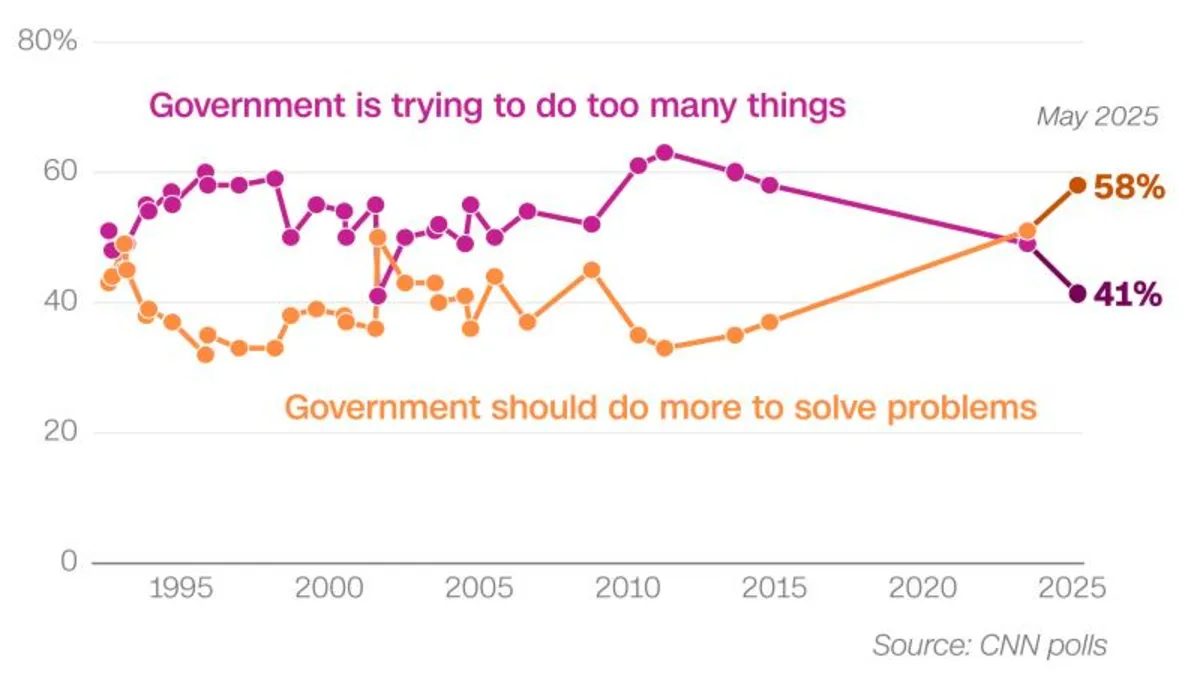
A recent CNN survey conducted by SSRS has uncovered significant skepticism among Americans regarding both the Republican and Democratic parties. The survey reveals that over 40% of respondents believe neither party has effective leadership or the ability to accomplish meaningful tasks. Despite this pervasive doubt, a growing number of Americans are beginning to recognize distinct differences between the two parties.
As public opinion evolves in the early months of Donald Trump’s second administration, the survey indicates a record-high percentage of Americans—58%—believe that the government should be more proactive in addressing societal issues. Interestingly, responses were evenly split on which party best represents their views regarding the role of the federal government, with one-third of respondents stating that neither party aligns with their beliefs.
Current skepticism about party effectiveness weighs heavily on the Democratic Party, with only 16% of respondents viewing them as the party with strong leaders. In contrast, 40% of Americans attribute this quality to the Republican Party. When it comes to the capacity to "get things done," a stark 36% of respondents lean towards the GOP, whereas only 19% favor the Democrats. A notable divide exists among party supporters, with Republican-aligned individuals significantly more likely to express confidence in their party's leadership and effectiveness compared to their Democratic counterparts.
An overwhelming majority—81%—of those surveyed acknowledge substantial differences between the two major parties, a noticeable increase from two years ago. However, despite recognizing these differences, nearly 20% of individuals who identify the parties as distinct still feel neither accurately represents their views on various issues. The perception that neither party is capable of enacting change is echoed by a large percentage of independent voters, who express discontent with both sides.
Another significant finding from the survey is the diminishing belief in the American Dream. Only 54% of Americans now believe that hard work guarantees success, a decline from 67% in 2016. This sentiment is particularly strong among younger voters and Black Americans, with 52% and 53%, respectively, stating that hard work does not guarantee success. This shift in perception correlates with growing concerns about the effectiveness of both political parties in representing the interests of the middle class, with a third of respondents stating that neither party embodies these values.
Although the Republican Party has historically been viewed favorably in areas like the economy and immigration, recent data indicates a decline in their perceived effectiveness. The GOP's lead on handling the economy has shrunk from a 15-point margin to just 7 points. Similarly, their advantage on immigration has decreased from 14 points to 6 points as public sentiment shifts. Americans are now evenly divided on which party's views on world affairs align more closely with their own.
Support for legal abortion remains robust, with 36% of respondents advocating for its legality under any circumstances. This marks a significant increase in support among Democrats, with 60% now backing unrestricted access to abortion. Although there is still a preference for the Democratic Party on abortion issues, this advantage has diminished from 16 points to just 10 points since last fall. The survey also highlights that Americans favor the Democratic Party over the Republican Party on social issues, including LGBTQ rights and racial equity.
Concerns about the state of U.S. democracy are prevalent, with roughly half of Americans believing democracy is currently under threat. This perception is particularly strong among Democrats, 72% of whom view democracy as being in crisis. Additionally, public apprehension about climate change persists, with a majority expressing concern about its impact on their communities. This issue remains a stronghold for the Democratic Party, which holds a 14-point advantage over Republicans on climate policies.
The CNN poll, conducted among 2,539 adults nationwide from May 5-26, has a margin of sampling error of plus or minus 2.7 percentage points. As political dynamics continue to shift, the findings from this survey underscore the evolving landscape of American political sentiment.